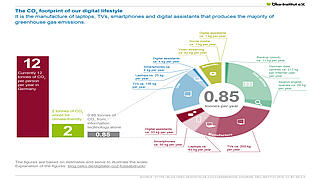The use of information and communication technologies (ICT) has been growing continuously for years. Digital terminal devices consume ever-increasing quantities of resources and energy. Rapid innovation cycles shorten the already brief lifetimes of electronic products and create a weighty energy and resource “backpack” at every stage in the lifecycle of digital terminals: from the manufacture of silicon chips to the transporting of raw materials and components, the use of IT products, including mobile devices such as laptops and smartphones, servers and storage facilities, and finally disposal.
The Oeko-Institut conducts sustainability assessments on a range of electronic products and identifies environmental impacts on a lifecycle basis. With these environmental audits, the experts create the frameworks for the identification and certification of low-impact products in the marketplace, for instance via ecolabels such as Blue Angel or the EU energy efficiency classification scheme. The Oeko-Institut also establishes a scientific basis for public procurement of IT products with improved environmental credentials.









